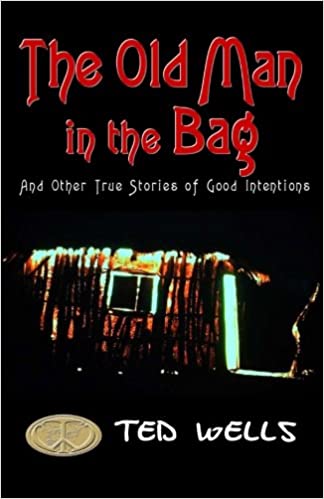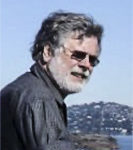Review — OLD MAN IN THE BAG by Ted Wells (Ethiopia)
 Old Man in the Bag
Old Man in the Bag
by Ted Wells (Ethiopia 1968-71)
Create Space Publisher
286 pages
November 2012
$4.95 (Kindle); $21.95 (Paperback)
Reviewed by Andrew Tadross (Ethiopia 2011-13)
•
The Peace Corps memoir is a literary typology in itself, one with a niche readership. It’s a safe bet that every RPCV has been told by an enthusiastic relative that they must absolutely chronicle their exotic adventures and foibles, their inevitable cultural misunderstandings, their painful failures, and their priceless victories in their valiant efforts to integrate into host communities and accomplish something significant in a 27-month window.
Ted Wells has published such a memoir that transports the reader into the world of wild and rural Ethiopia in the late 1960s, with him and his newlywed wife Helen. Idealistic, naïve, determined, and with an admirable sense of humor, this couple weather the discomforts that come with the territory… intestinal assaults, hellish bus rides, local political dramas, and inconsiderate roosters. Ted’s first-person account of their experience is interspersed with the text of letters sent home to his parents. Their period of service is set against the backdrop of the Vietnam War and civil unrest in Ethiopia, during the late stages of Haile Selassie’s reign. Ted has quite matter of fact that the Peace Corps was an avenue to avoid the draft, but nevertheless put his energies dutifully into his service amongst the people of Shileh; a village of Amhara transplants who settled deep in the Guji Oromo zone of Southern Ethiopia.
As someone who volunteered nearly 50 years later, I have great respect for the decades of volunteers who served without smartphones, laptops, and hard drives full of movies, podcasts, translation apps, or Kindle books in which to escape. Some might argue that this was the REAL Peace Corps experience, and the 21st-century volunteer only gets the watered-down version. Though I believe feelings of frustration, depression, and isolation that come with living outside one’s familiar culture are universal to volunteers.
With training in architecture and urban planning, Ted set about to help villagers of Shileh build termite-free dwellings, and involved himself in various town planning activities, while Helen ran a health center to fight malaria and gardened extensively. Having a similar educational background as Ted’s, I can personally identify with the joys and challenges of such a hands-on application of one’s skill set, especially in contrast to the technocratic modes of modern design and planning. Behind the technology, there are always human consequences.
The title of this book The Old Man in the Bag: and other True Stories of Good Intentions’ hardly indicates the subject matter, but it does indicate the theme of many of Ted’s stories. That is, the intentions of Ted and Helen’s efforts were often more altruistic than the outcome. For example, Ted embarks on an effort to eradicate baboons who were eating local crops, yet when it is too late, he sees the ‘humanity’ in the dying creatures. He insults his village neighbor by replacing the rooster he accidentally killed with another one, thinking a one-for-one trade was appropriate. He stumbles into many a cultural pitfall of trying to ‘help’ with unintended consequences. But we must consider perhaps it’s a human trait, as one story recounts a community gathering to mourn for a dying village elder but which concludes in mourners angrily shouting at each other over who would pay for the booze.
The concept of ‘good intentions’ might be emblematic of the Peace Corps in general. Many PCV’s struggled to create an impactful project, only to have it defunded, neglected, eaten by goats, washed away, or destroyed…like a sandcastle in the surf. My own water project was locked up in disrepair within a few years, and a beautiful new library built by RPCVs was looted in the Tigray conflict. Does that mean the activity and the effort were futile and worthless? That’s up for debate. Perhaps the experience for both the volunteer and their host is worth the cost, but good luck quantifying that in a cost-benefit spreadsheet for Congressional hearings. Surely, the relationships built, and the experience developed by the volunteer has immeasurable value. Still, one wonders if these are Sisyphean goals.
Some years after his Peace Corps service, Ted and his wife immigrated to New Zealand, where he continued to work in planning on a local level and in several different countries in the South Pacific. His other writings take on themes of consensus building and global problem-solving.
Ted’s account jogged many a memory for me as if we had parallel experiences nearly 50 years apart. I particularly enjoyed his transliteration of Amharic dialogues and marveled at his ability to recount events in great detail, which are augmented by several dozen black and white photographs. Another wrinkle of this memoir is his relationship with Helen, describing the ups and downs of newlyweds trying to thrive in challenging terrain. Ted’s humility and willingness to admit his own misassumptions as a husband and a volunteer offer a reflective tone in this book, that makes it much more than a compilation of nostalgic stories. If anything, this book reminds us to keep a journal, contemplate our experience, and consider if the Peace Corps memoir of the future should be much like that of the past.
•
Andrew Tadross served in the Peace Corps from 2011-13 in Tigray, Ethiopia. He is a landscape architect, and co-author of several linguistic guides for Amharic, Afan Oromo, and Tigrinya.

No comments yet.
Add your comment